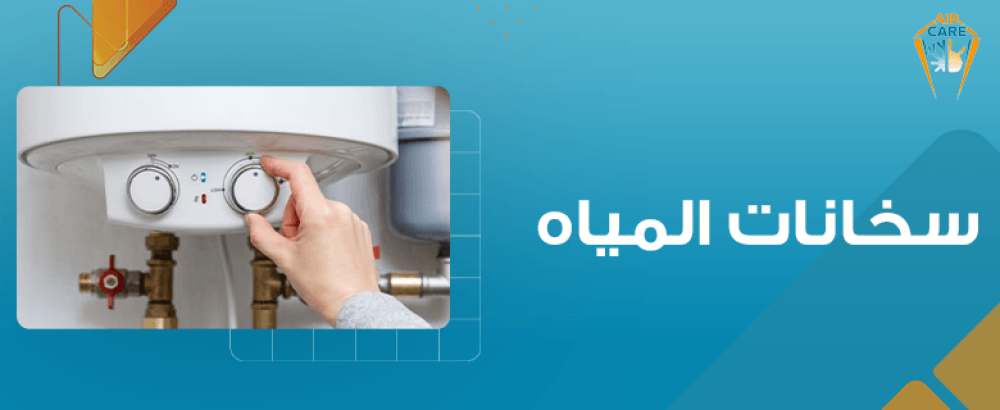How do energy-efficient water heaters improve the quality of your daily life?
How do energy-saving water heaters improve your daily quality of life? Having energy-saving water heaters is the perfect solution, as this advanced technology provides you with hot water with high efficiency and lower costs, while preserving the environment, so at Air Care Store we provide the best types of energy-saving heaters with modern designs and reliable performance that meet your daily needs, for your comfort.
How do water heaters help save energy?
Modern water heaters feature advanced technologies that aim to reduce energy consumption and improve efficiency. Here are the most important features and technologies that make water heaters an energy-saving option:
High Efficiency Tankless Water Heaters
These tankless heaters, known as on-demand water heaters, heat water only when it is needed, and this design eliminates the standby heat loss found in traditional tankless heaters, significantly reducing energy consumption.
Condensation technology
Some gas water heaters use condensation technology to utilize exhaust gases, extracting additional heat from these gases. This technology enhances the efficiency of water heaters, making them an ideal choice for energy saving.
Heat pump water heaters
These heaters rely on transferring heat from the air or ground to heat the water instead of generating heat directly, and this method makes them more energy efficient, especially in areas with warm climates, which reduces electricity consumption compared to traditional heaters.
Smart Controls and Programmable Thermostats
Modern water heaters come with smart controls, which allow the user to adjust temperature settings, monitor energy consumption, and program schedules remotely, which helps improve efficiency and save energy.
Enhanced insulation
Many modern heaters have advanced insulation layers, which help reduce heat loss within the tank, reducing the need to consume additional energy to maintain the water temperature.
Self-cleaning feature
Some water heaters include self-cleaning mechanisms that prevent sediment build-up inside the tank. Sediment build-up can reduce the efficiency of the heater, so this feature ensures better performance and longer life for the heater.
High Energy Factor (EF) Ratings
Water heater efficiency is based on energy factor (EF) ratings. These ratings show the overall efficiency of the unit, taking into account factors such as heat loss and heat exchanger performance, helping you choose the most suitable and efficient water heater.
Solar water heating systems
These systems use the sun's energy to heat water before it is fed into a conventional heater, and although the initial installation costs are high, they save significant energy in the long run, making them an environmentally friendly and cost-effective option.
Thermal expansion tanks
Water heaters of this type help manage the pressure resulting from thermal changes in the system, which reduces stress on the water heater. This feature also extends the life of the heater and increases energy efficiency.
How to Keep Your Water Heater System in Good Condition
A water heater is an important investment to ensure reliable and efficient hot water supply, and to keep it in excellent condition, you can follow the following tips:
Periodic maintenance
Regular maintenance plays an essential role in maintaining the performance of water heaters, so it is preferable to check the pipes and valves regularly to detect any leaks or damage. The condition of the tank should also be checked to ensure that it is free of rust or sediment accumulation, and it is necessary to check the cables and electrical connectors to ensure their safety.
Tank cleaning
Over time, sediment and limescale may build up inside the tank, reducing the efficiency of the water heater, so empty and clean the tank regularly using cleaning materials designed to remove sediment and limescale, ensuring better performance and a longer life for the heater.
Check pressure and temperature
Adjusting the water pressure and temperature is essential, as the right pressure ensures that the water is distributed perfectly throughout the house, while the right temperature ensures that hot water is available at the required level without exceeding safe limits.
Types of modern water heaters
Modern water heaters are an advanced option to meet hot water needs effectively and efficiently. Types of heaters vary based on the design and technology used. The following are the main types:
electric water heater
These heaters use electrical energy to heat water inside an insulated tank. They are easy to install and use, and are a popular choice for small homes, but they may consume more energy than other types.
Gas water heater
These heaters rely on natural gas or LPG to heat water, and are highly efficient and heat water quickly, making them an economical and long-lasting option, especially in large homes.
Tankless Water Heater (On Request)
These heaters heat water as it flows, eliminating the need for a storage tank. They are an energy-efficient option because they only heat water when needed, and are suitable for homes with small spaces.
Heat pump water heater
It relies on transferring heat from the air or ground to the water, making it an environmentally friendly and energy-efficient option, so it is ideal in warm climates and requires lower operating costs in the long run.
Solar water heater
Solar energy is used to heat water through solar panels installed on the roof, and despite its high initial cost, it saves a lot of energy costs and is an effective option.
Condensing water heater
This technology is often found in gas heaters, where exhaust gases are used to recycle waste heat. This technology helps improve thermal efficiency and reduce energy consumption.
Common Water Heater Malfunctions and How to Deal with Them
There are several common water heater faults that are important to know in order to deal with them properly:
The water is not heating up.
The problem of not heating water is one of the common malfunctions in heaters, and the reason behind this is often a malfunction in the heating element or thermostat. The best solution is to check the element and thermostat and replace them if necessary.
The water is warmer than desired or too hot.
When the water temperature is higher than the desired level, the cause may be an incorrect thermostat setting or an internal fault in it, and the problem can be solved by resetting the temperature to the appropriate level.
Water leaking from the heater
Water leakage from the heater is a problem that may result from damage to the heater tank or weak connections and valves, so this problem can be dealt with by repairing or replacing the connections and valves.
Strange noises or sounds from the heater
The appearance of abnormal noises or sounds from the heater is often caused by the accumulation of sediment or limescale inside the tank or on the heating element. To maintain the efficiency of the heater and reduce this problem, it is recommended to clean the tank.
Low hot water pressure
A decrease in hot water pressure may be noticed due to clogged pipes or heater valves as a result of sediment accumulation. The solution lies in cleaning the valves and checking the pipes.
The heater stopped working completely.
When the heater stops working completely, the cause may be a fault in the electrical connections or a problem with the thermal cut-off switch. In this case, the electrical connections must be carefully checked and the thermal switch replaced.
Learn about the most important features and malfunctions of water heaters through the Air Care store , and get the best types of home electrical appliances with great technical specifications and an exclusive price.

